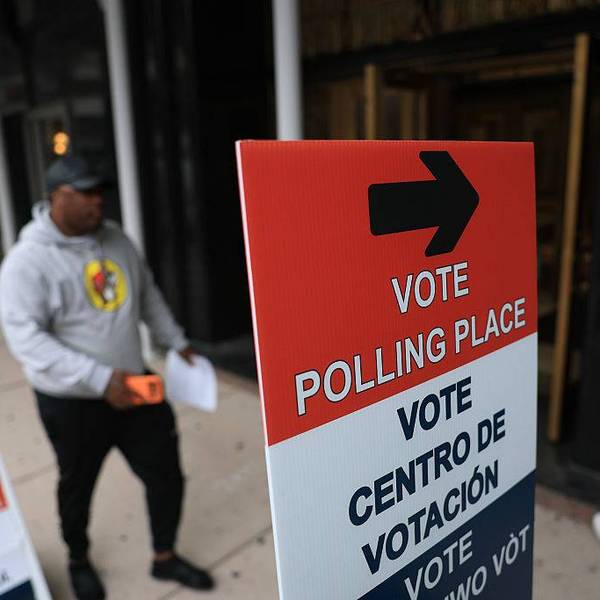As Senate Republicans rammed through a rules change enabling faster approval of President Donald Trump's judicial nominees, two advocacy groups released reports on Wednesday showing the far-reaching and long-lasting damage his confirmed federal judges have already inflicted on the nation.
People for the American Way (PFAW) and Alliance for Justice (AFJ) both published studies Wednesday about Trump's success in appointing 92 judges to district courts, federal appeals courts, and the U.S. Supreme Court--with PFAW writing that the president's effort to remake the judicial branch in his own image could be disastrous for a number of marginalized groups.
"The record number of judges appointed by Trump and confirmed by the Senate to lifetime posts on the Supreme Court and federal courts of appeals is by far the biggest impact thus far of the Trump presidency." --Elliot Mincberg, PFAW
"In just under two years on the bench, these narrow-minded elitist judges have already harmed workers, consumers, voters, immigrants, reproductive rights, and many more," wrote the group in its report, "Confirmed Judges, Confirmed Fears."
The report was published shortly before the GOP-controlled Senate triggered the so-called "nuclear option" by voting 51-48 to allow the approval of most executive nominations with a simple majority vote. Trump's future judicial nominees will be subject to just two hours of debate instead of an additional 30 hours.
Trump's two most high-profile appointments so far are those of Supreme Court Justices Neil Gorsuch and Brett Kavanaugh, whose most recent pro-death penalty ruling was called "bloodthirsty" and "atrocious" by critics.
But the groups also highlighted the 37 judges who now have seats on the Circuit Courts of Appeals, which often has final say in federal cases that do not make it to the Supreme Court.
Trump's influence has made its way into the 6th Circuit Court of Appeals, where four of his appointees upheld an Ohio law barring funding to Planned Parenthood; and the 7th Circuit, where four judges appointed by Trump went against federal law when they ruled that older workers cannot claim discrimination by their employers.
"The record number of judges appointed by Trump and confirmed by the Senate to lifetime posts on the Supreme Court and federal courts of appeals is by far the biggest impact thus far of the Trump presidency," PFAW Senior Fellow Elliot Mincberg said in a statement.
During his time in office, Trump has rapidly remade the judiciary compared to his predecessor. Due to unprecedented levels of obstruction by the Republicans in the Senate--a minority party at the time--former President Barack Obama was only able to appoint 16 appellate judges to circuit courts two years into his presidency, while Trump and the Republican-controlled Senate have pushed through nearly twice as many.
PFAW and AFJ pointed to judges including Amy Coney Barrett, on the 7th Circuit appeals court, as an example of how Trump's judiciary appointments--which often go largely unnoticed by the public and the corporate media--will have far-reaching effects on marginalized communities.
As detailed in AFJ's report--titled "Trump's Attacks on Our Justice System" (pdf)--Barrett ruled in 2017 that a corporation should be permitted to racially segregate a workplace, has criticized proposed reforms for sentencing guidelines, and voted to overturn a law banning people convicted of felonies from buying firearms.
"Why do these appointments matter? Of our three branches of government, two and a half are now squarely in the control of the current conservative Republican party," wrote former U.S. District Court Judge Shira Scheindlin in the Guardian Wednesday. "This is the party that seeks to roll back a hundred years of progress with respect to women's rights, racial justice, equal opportunity, workers' rights, environmental protection and, of course, voting rights. The federal courts will soon be the last place to go to seek justice. We can only hope that our state courts remain up to the task of ensuring justice for all. It is unlikely they will find comfort in the federal courts."
AFJ noted that Trump's rapid-fire remaking of the judicial branch of government also has implications for how he is treated by the courts. Trump faces investigations into his charity and business dealings as well as a number of cases regarding his possible violation of the Constitution's Emoluments Clause--and at least one of his Supreme Court appointees has indicated that he believes a sitting president cannot be indicted.
"President Trump sees two purposes for the federal judiciary," said Nan Aron, President of Alliance for Justice. "One is as a tool to accomplish an anti-worker, anti-woman, anti-health care, anti-LGBTQ, anti-racial justice agenda that is too unpopular to pass through the legislative process. The other is to protect himself from legal jeopardy."
"Both are undemocratic and unjust goals for a branch of our government that is supposed to uphold the rights of all Americans," she added.




